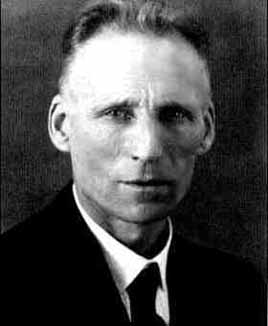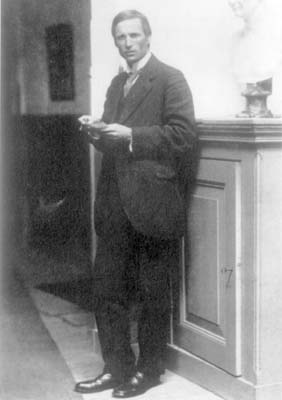<Back to Index>
- Mathematician Luitzen Egbertus Jan Brouwer, 1881
- Painter Carel Fabritius, 1622
- Roman Emperor Caesar Flavius Valerius Aurelius Constantinus Augustus, 272


Luitzen Egbertus Jan Brouwer (February 27, 1881, Overschie – December 2, 1966, Blaricum), usually cited as L. E. J. Brouwer but known to his friends as Bertus, was a Dutch mathematician and philosopher, a graduate of the University of Amsterdam, who worked in topology, set theory, measure theory and complex analysis.
Early in his career, Brouwer proved a number of theorems that were breakthroughs in the emerging field of topology. The most celebrated result was his proof of the topological invariance of dimension. Among his further results, the Brouwer fixed point theorem is also well known. Brouwer also proved the simplicial approximation theorem in the foundations of algebraic topology, which justifies the reduction to combinatorial terms, after sufficient subdivision of simplicial complexes, of the treatment of general continuous mappings.
Brouwer in effect founded the mathematical philosophy of intuitionism as an opponent to the then-prevailing formalism of David Hilbert and his collaborators Paul Bernays, Wilhelm Ackermann, John von Neumann and others. As a variety of constructive mathematics, intuitionism is essentially a philosophy of the foundations of mathematics. It is sometimes and rather simplistically characterized by saying that its adherents refuse to use the law of excluded middle in mathematical reasoning.
Brouwer was member of the Significs group, containing others with a generally neo-Kantian philosophy. It formed part of the early history of semiotics -- the study of symbols -- around Victoria, Lady Welby in particular. The original meaning of his intuitionism probably can not be completely disentangled from the intellectual milieu of that group.
In 1905, at the age of 26, Brouwer expressed his philosophy of life in a short tract Life, Art and Mysticism described by Davis as "drenched in romantic pessimism". Schopenhauer had a formative influence on Brouwer, not least because he insisted that all concepts be fundamentally based on sense intuitions. Brouwer then "embarked on a self-righteous campaign to reconstruct mathematical practice from the ground up so as to satisfy his philosophical convictions"; indeed his thesis advisor refused to accept his Chapter II " 'as it stands, ... all interwoven with some kind of pessimism and mystical attitude to life which is not mathematics, nor has anything to do with the foundations of mathematics' " Nevertheless, in 1908 Brouwer, in a paper entitled "The untrustworthiness of the principles of logic", challenged the belief that the rules of the classical logic, which have come down essentially from Aristotle (384--322 B.C.), have an absolute validity, independent of the subject matter to which they are applied".
"After completing his dissertation (1907), Brouwer made a conscious decision to temporarily keep his contentious ideas under wraps and to concentrate on demonstrating his mathematical prowess"; by 1910 he had published a number of important papers, in particular the Fixed Point Theorem. Hilbert -- the formalist with whom the intuitionist Brouwer would ultimately spend years in conflict -- admired the young man and helped him receive a regular academic appointment (1912) at the University of Amsterdam. It was then that "Brouwer felt free to return to his revolutionary project which he was now calling intuitionism ".
He was combative for a young man. He was involved in a very public and eventually demeaning controversy in the later 1920s with Hilbert over editorial policy at Mathematische Annalen, at that time a leading learned journal. He became relatively isolated; the development of intuitionism at its source was taken up by his student Arend Heyting. Towards the end of his life he felt more and more isolated, and spent his last years under the spell of 'totally unfounded financial worries and a paranoid fear of bankruptcy, persecution and illness.' He was killed in 1966 at the age of 85, struck by a vehicle while crossing the street in front of his house.